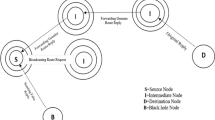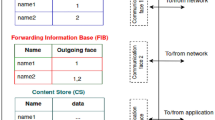Abstract
Network lifetime of mobile ad hoc networks is limited by the battery power of the mobile nodes. Energy saving can be achieved by operating the nodes in power save mode (PSM). Cooperative communication provides the cooperative diversity and the performance of the network can be improved by using cooperative relays. A new cooperative modified Bellman ford algorithm (CMBFA) using PSM is proposed to improve the performance of the network. Distributed Bellman ford algorithm (DBFA) is considered as a basic routing protocol. A modified Bellman-ford algorithm (MBFA) also called as Non-cooperative MBFA (NCMBFA) is developed by modifying the DBFA. In NCMBFA, residual energy of a node is considered to select the optimal path for routing the packets. NCMBFA is energy efficient and suitable for Grid topology using PSM. In the proposed CMBFA, the nodes in the Grid topology are categorized into amplify-and-forward and decode-and-forward nodes using the received signal-to-noise ratio at the relay. All the DF nodes are considered for routing and the optimum route is calculated using the NCMBFA. For CMBFA and NCMBFA, the bit error rate performance of the network for BPSK, QPSK, and 64-QAM modulation schemes are analyzed. The performance metrics of the packet received, delay and the average jitter of CMBFA and NCMBFA are compared. Simulation results show clearly that CMBFA gives better performance over NCMBFA and CMBFA consumes less energy compared to NCMBFA using PSM.










Similar content being viewed by others
References
Namboodiri, V., & Gao, L. (2010). Energy-efficient VoIP over wireless LANs. IEEE Transactions on Mobile Computing,9(4), 566–581. https://doi.org/10.1109/tmc.2009.150.
Vukadinovic, V., Glaropoulos, I., & Mangold, S. (2014). Enhanced power saving mode for low-latency communication in multi-hop 802.11 networks. Journal of Ad Hoc Networks,23, 18–33.
IEEE 802.11-2012 standard. http://standards.ieee.org/getieee802/download/802.11-2012.pdf.
Tseng, Y. C., Hsu, C. S., & Hsiesh, T. Y. (2002). Power-saving protocols for IEEE 802.11-based multi-hop ad hoc networks. In IEEE 21st annual joint conference of the IEEE computer and communications societies (INFOCOM), (Vol. 1, pp. 200–209).
Cui, S., Goldsmith, A. J., & Bahai, A. (2004). Energy-efficiency of MIMO and cooperative MIMO techniques in sensor networks. IEEE Journal on Selected Areas in Communications,22(6), 1089–1098.
Nosratinia, A., Hunter, T. E., & Hedayat, A. (2004). Cooperative communication in wireless networks. IEEE Communications Magazine,42(10), 74–80.
Wang, S., & Nie, J. (2010). Energy efficiency optimization of cooperative communication in wireless sensor networks. EURASIP Journal on Wireless Communications and Networking—Special issue on theoretical and algorithmic foundations of wireless ad hoc and sensor networks, Vol. 2010, Article No. 3.
Yang, W., Li, L., & Sun, W. (2010). Energy-efficient relay selection and optimal relay location in cooperative cellular networks with asymmetric traffic. Journal of China Universities of Posts and Telecommunications, 17(6), 80–88.
Yu, M., & Li, J. (2005). Is amplify-and-forward practically better than decode-and-forward or vice versa. In Proceedings. (ICASSP ‘05). IEEE international conference on acoustics, speech, and signal processing, 2005. (Vol. 3, pp. 365–368).
Laneman, J. N., & Wornell, G. W. (2003). Distributed space-time coded protocol for exploiting cooperative diversity in wireless networks. IEEE Transactions on Information Theory,49(10), 2415–2525.
Bletsas, A., Khisti, A., Reed, D. P., & Lippman, A. (2006). A simple cooperative diversity method based on network path selection. IEEE Journal on Selected Areas in Communications,24(3), 659–672.
Bletas, A., Shin, H., & Win, M. Z. (2007). Cooperative communications with outage optimal opportunistic relaying. IEEE Transaction on Wireless Communications,6(9), 3450–3460.
Zhou, Z., Zhou, S., Cui, J. H., & Cui, S. (2008). Energy-efficient cooperative communication based on power control and selective single-relay in wireless sensor networks. IEEE Transactions on Wireless Communications, 7(8), 3066–3078.
Zhao, Yi, Adve, R., & Lim, T. J. (2006). Symbol error rate of selection amplify-and forward relay systems. IEEE Communications Letters,10(11), 757–759.
Kiratipongvooth, P., & Sittichivapak, S. (2011). Bit error probability of cooperative diversity for M-ary QAM OFDM-based system with best relay selection. In International conference on information and electronics engineering (ICIEE 2011), (Vol. 6, pp. 95–99).
Maham, B., Debbah, M., & Hjorungnes, A. (2008). Energy-efficient cooperative routing in BER constrained multi-hop networks. ChinaCom,1, 1–2. https://doi.org/10.1109/chinacom.2008.4684995.
Liu, D., & Yue, G. (2009). Capacity analysis on OFDM based two-hop regenerative wireless networks with selective relaying. In CMC ‘09 proceedings of the 2009 WRI international conference on communications and mobile computing, (Vol. 01, pp. 131–135).
Bouanen, S., Boujemaa, H., & Ajib, W. (2011). Threshold-based adaptive decode-amplify-forward relaying protocol for cooperative systems. In Proceedings of the 7th international wireless communications and mobile computing conference (IWCMC) 2011, (pp. 725–730).
Chen, Q., & Gursoy, M. C. (2010). Energy efficiency analysis in amplify-and-forward and decode-and-forward cooperative networks. In 2010 IEEE wireless communications and networking conference (WCNC), (pp. 1–6).
Nema, T., Waoo, A., & Sharma, P. S. (2012). Energy based AODV routing algorithm with sleep mode in MANETs. International Journal of Computer Applications (IJCA), 58(19).
Devi, B. R., Rao, K. K., & Rani, M. A. (2012). Bit error probability analysis of cooperative relay selection OFDM systems based on SNR estimation. In 16th WSEAS international conference on computers (part of the 16th CSCC/CSCC 2012), (pp. 427–432).
Boddu, R. D., Rani, M. A., & Rao, K. K. (2014). Energy efficient cooperative node selection for OFDM systems based on snr estimation. International Journal of Advances in Computer, Electrical & Electronics Engineering,3(1), 32–36.
Sergiou, C., & Vassiliou, V. (2010). Energy utilization of HTAP under specific node placements in wireless sensor networks. In IEEE wireless conference (EW), (pp. 482–487).
Saranya, A. S., & Ravi, G. (2015). A review on power saving techniques in MANET. International Journal of Scientific and Research Publications,5(5), 1–4.
Singh, S., Woo, M., & Raghavendra, C. S. (1998). Power-aware routing in mobile ad hoc networks. In Proceedings of the 4th annual ACM/IEEE international conference on Mobile computing and networking (MobiCom’98), Dallas (pp. 181–190).
Li, J., Cordes, D., & Zhang, J. (2005). Power-aware routing protocols in ad hoc wireless networks. IEEE Wireless Communications,12(6), 69–81.
Chokhawala, J., & Cheng, A. M. K. (2004). Optimizing power aware routing in mobile ad hoc networks. Houston: Real Time Systems Laboratory Department of Computer Science, The University of Houston University Park Houston.
Hwang, R. H., Wang, C. Y., Wu, C. J., & Chen, G. N. (2013). A novel efficient power-saving MAC protocol for multi-hop MANETs. International Journal of Communication Systems,26(1), 1–2. https://doi.org/10.1002/dac.1328.
Sheu, J. P., Chao, C. M., & Sun, C. W. (2004). A clock synchronization algorithm for multi-hop wireless ad hoc networks. In IEEE International Conference on Distributed Computing Systems (ICDCS), (pp. 574–581).
Chen, G.-N., Wang, C.-Y., & Hwang, R.-H. M. T. S. P. (2007). Multi-hop time synchronization protocol for IEEE 802.11 wireless ad hoc network. Journal of Information Science and Engineering,23(4), 969–983.
Zheng, R., Hou, J. C., & Sha, L. (2006). Optimal block design for asynchronous wake-up schedules and its applications in multi-hop wireless networks. IEEE Transactions on Mobile Computing,5(9), 1228–1241.
Wu, S. H., Chen, M. S., & Chen, C. M. (2008) Fully adaptive power saving protocols for ad hoc networks using the hyper quorum system. In IEEE international conference on distributed computing systems (ICDCS), (pp. 785–792).
Pandey, K., & Swaroop, A. (2011). A comprehensive performance analysis of proactive, reactive and hybrid MANETs routing protocols. International Journal of Computer Science,8(6), 432–441.
Cui, S., Goldsmith, A. J., & Bahai, A. (2005). Energy-constrained modulation optimization. IEEE Transactions on Wireless Communications,4(5), 2349–2360.
Prabhu, R. S., Daneshrad, B., & Vandenberghe, L. (2007). Energy minimization of a QAM System. In IEEE wireless communications and networking conference (WCNC 2007), (pp. 729–734).
Chen, Q., & Gursoy, M. C. (2009). Energy-efficient modulation design for reliable communication in wireless networks. In IEEE 43rd annual conference on information sciences and systems.
Wang, S., & Nie, J. (2010). Energy efficiency optimization of cooperative communication in wireless sensor networks. EURASIP Journal on Wireless Communications and Networking—Special issue on theoretical and algorithmic foundations of wireless ad hoc and sensor networks, 2010(3).
Jayakumar, G., & Ganapathi, G. (2008). Reference point group mobility and random waypoint models in performance evaluation of MANT routing protocols. Journal of Computer Systems, Networks and Communications.
Jardosh, A., Belding Royer, E. M., Almeroth, K. C., & Suri, S. (2003). Towards realistic mobility models for mobile ad hoc networks. MobiCom’03, (pp. 217–229).
Yang, Y., Wang, J., & Kravets, R., (2005). Designing routing metrics for mesh networks. In IEEE workshop on wireless mesh networks (WiMesh). www.cs.ucdavis.edu/~prasant/wimesh.
Boddu, R. D., Rao, K. K., & Rani, M. S. (2015). Energy efficient modified Bellman ford algorithm for grid and random network topologies. In IC3T-2015, Springer series AISC, (Vol. 379, pp. 143–151).
Boddu, R. D., Rao, K. K., & Rani, M. S. (2015). Energy efficient routing algorithm for MANETs. International Journal of Advances in Computer Networks and Its Security (IJCNS),5(2), 40–44.
QualNet 6.1 User’s Guide. (2012). Scalable network technologies. http://www.scalable-networks.com.
Boddu, R. D., Rao, K. K., & Rani, M. S. (2015). Co-operative shortest path relay selection for multi-hop MANETs. In Proceedings of the 3rd international conference on frontiers of intelligent computing: theory and applications (FICTA) 2014, advances in intelligent systems and computing, (Vol. 328, pp. 697–706).
Boddu, R. D., Rao, K. K., & Rani, M. S. (2015). Performance analysis of modified Bellman ford algorithm using cooperative relays. In Emerging ICT for bridging the future–proceedings of the 49th annual convention of the computer society of India CSI Volume 2, Springer, Advances in intelligent systems and computing series, (Vol. 338, pp. 239–249, ISSN: 2194-5357).
Park, J. C., Do, T. T., & Kim, Y. H. (2010). Outage probability of OFDM-based relay networks with relay selection. In 2010 IEEE 71st vehicular technology conference (VTC 2010-Spring), (pp. 1–5).
Author information
Authors and Affiliations
Corresponding author
Additional information
Publisher's Note
Springer Nature remains neutral with regard to jurisdictional claims in published maps and institutional affiliations.
Rights and permissions
About this article
Cite this article
Devi, B.R., Rao, K.K. & Rani, M.A. Application of Modified Bellman-Ford Algorithm for Cooperative Communication. Wireless Pers Commun 109, 2025–2049 (2019). https://doi.org/10.1007/s11277-019-06666-7
Published:
Issue Date:
DOI: https://doi.org/10.1007/s11277-019-06666-7




